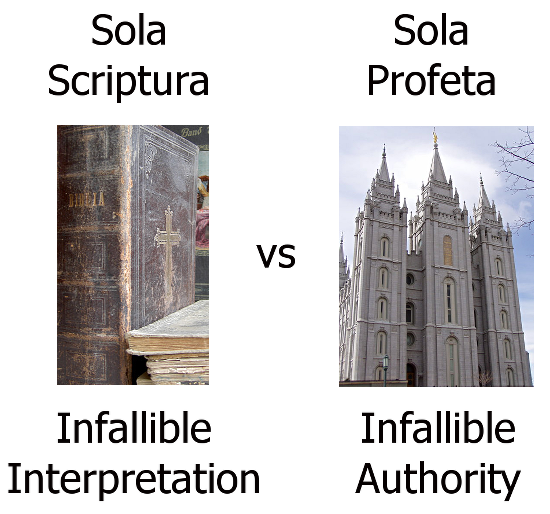Why Darwin Didn’t Use God to Explain Evolution
Did Galileo use God as the explanation for why he thought planets revolved around the sun, or did he dig deeper trusting in math and calculations to form his ideas and then seek evidence to support it?
Did Galileo use God as the explanation for why he thought planets revolved around the sun, or did he dig deeper trusting in math and calculations to form his ideas and then seek evidence to support it?
If the Bible does not ultimately lead us to Christ, what purpose does it serve? The objective is to come to Him, not the Bible (or a prophet). Scripture is a means, not an end.

Jesus was the Word, creator of the earth
He is the Prince of Peace, Son of the virgin birth
I penned new words to a primary song earlier this week. Today I composed and published this video on YouTube. Enjoy!
(to the tune of Follow the Prophet)
Jesus was the Word, creator of the earth
He is the Prince of Peace, Son of the virgin birth
In the garden and the cross He suffered for our sin
By faith, grace, and repentance, I can come to Him
Follow the Savior, Follow the Savior, Follow the Savior, don’t go astray
Follow the Savior, Follow the Savior, Follow the Savior, He knows the way
“Isn’t fighting against something, still encouraging fighting?” I asked… Then I posed, “Is it better to hate war, or love peace?”
I’ve come to the conclusion that there’s something inherently wrong with attempting to eradicate evil.
Back in April I was invited to an event for a small group of artists where a presentation was given to promote the battle against porn by an organization called Fight The New Drug.
The movement began as a grassroots campaign from a group of college students who were concerned about the harmful effects of porn.
The movement’s About Page features a video that states, “We’ve made it our life’s focus to raise awareness on the harmful effects of porn”, and concludes with “Join the movement and become a fighter”.
Over time, Clay Olsen, CEO and co-founder, quit his job to do this full time. In 2009 it officially became a 501(c)(3) non-profit organization and now employs talented people to support the movement and raise awareness.

The presenter, Whitney Van Wagoner (Office Manager for Fight The New Drug), was sporting an attractive red T-Shirt with the slogan, “Porn Kills Love”. During her presentation I pointed out that the words could be switched to say “Love Kills Porn” to give a more positive twist to the message. I questioned the emphasis on “joining the fight”.
“Isn’t fighting against something, still encouraging fighting?” I asked.
I shared a quote that I like from Mother Teresa, “I was once asked why I don’t participate in anti-war demonstrations. I said that I will never do that, but as soon as you have a pro-peace rally, I’ll be there.”
Then I posed, “Is it better to hate war, or love peace?”

Whitney got my point and was quick to agree. Then she pointed out that the movement emphasizes REAL love, with positive slogans like:
Love something that loves you back
Love takes two
Real love is sexy
Keep it real
Live for love
I left agreeing with the good the organization is doing. Nevertheless, after the meeting I continued to reflect on the need for an organization dedicated to raising awareness about the evils of porn. For that matter, what’s wrong with any organization whose mission is to raise awareness about or eradicate the existence of anything deemed “evil”.
Something about capitalizing on fighting against anything “bad” makes me tend to question motives (“non-profit” doesn’t mean that nobody is profiting from it). I’m reminded of the documentary, Pink Ribbons Inc., Capitalizing on Hope.
“The film documents how some companies use pink ribbon-related marketing to increase sales while contributing only a small fraction of proceeds to the cause, or use “pinkwashing” to improve their public image while manufacturing products that may be carcinogenic.”
(wikipedia article, Pink Ribbons Inc.)
I believe it is the nature of institutions to take on a life of their own. Over time they tend to protect themselves and fight to survive just like any other living thing. In the case of Fight The New Drug, for example, if any solution emerged that could actually eliminate porn, it would threaten the life of the organization. There are people whose livelihoods depend on the existence of the organization, and, because it’s mission is to fight against it, the organization requires the existence of porn in order to survive. (Perhaps Mother Teresa really does make a good point)
The story of the March of Dimes gives a better example of what happens when an organization, whose mission was to find a cure for polio, struggled to survive after the cure was found.
“In his book Essentials of Sociology: A Down-to-Earth Approach, sociologist Professor James M. Henslin describes March of Dimes as a bureaucracy that has taken on a life of its own through a classic example of a process called goal displacement. Faced with redundancy after Jonas Salk discovered the polio vaccine, it adopted a new mission, ‘fighting birth defects’, which was recently changed to a vaguer goal of “breakthrough for babies”, rather than disbanding.”
Greenwald, Howard P. (2007). Organizations: Management Without Control. Sage Publications, Inc. p. 369. (reference given in wikipedia)
How does this apply to contending for or against [insert your pet thing here]
Women’s rights
Black rights
Gay rights
Someone else’s false religion
Someone else’s false political ideology
Contending is contending, regardless of however noble you feel your cause is. Is it possible to stand for your cause without contending about it?
There appear to be two opposing forces at work, one destructive and the other creative. A destructive force that fights against terrorists and attempts to eradicate them from off the face of the earth only ends up creating terrorists faster than you can kill them, like Hercules cutting off heads of Hydra that multiply faster than he can cut them off. Such is the fate that rises from a mentality that embraces the elimination of evil in the world.
A creative force, on the other hand, seeks to build up instead of tear down. Love is the great healer. The Mother Teresa approach of focusing on the merits of promoting good lead to more than just eliminating evil. One converted to Christ who has “no more disposition to do evil, but to do good continually” (Mosiah 5:2. See also Rom 8:1-4), has not only solved a porn problem, but a multitude of evils.
I wanted to join in the singing, but being powerless to do so, I simply felt the music in my heart.
A late snow in early spring inspired the following meditation.
This morning I took a walk after the sun had come out. I walked along the river and joined in the celebration of the trees. As the snow from last night’s storm melted from their drooping branches it felt like walking in gentle rain when I passed under them. I smiled at them and gave tribute to their strength for enduring the burden of snow that left their branches strained and drooping under the weight. Surrounded by casualties of broken limbs that did not survive the night, the sound of the placid dripping to me felt like a celebration song. I wanted to join in the singing, but being powerless to do so, I simply felt the music in my heart and thanked them for allowing me to witness their branches, leaving their burdens behind, raise toward heaven in praise.

I was reminded that only a few short weeks ago, I apologized to the apple trees in my yard for the pain I certainly inflicted on them when I cut off branches that yielded no fruit and pruned others so that the tree’s strength would be dedicated to producing better fruit. I took note of the burden of snow on their branches as I hurried off to work this morning, but as I pulled away I thought I could feel their gratitude. Because of the offensive pruning they endured, they now could feel the vigor of their strength as they strained under the storm’s heavy load they now bore.
“I am the true vine, and my Father is the husbandman. Every branch in me that beareth not fruit he taketh away: and every branch that beareth fruit, he purgeth it, that it may bring forth more fruit.
Now ye are clean through the word which I have spoken unto you.
Abide in me, and I in you. As the branch cannot bear fruit of itself, except it abide in the vine; no more can ye, except ye abide in me. I am the vine, ye are the branches: He that abideth in me, and I in him, the same bringeth forth much fruit: for without me ye can do nothing. If a man abide not in me, he is cast forth as a branch, and is withered; and men gather them, and cast them into the fire, and they are burned.
If ye abide in me, and my words abide in you, ye shall ask what ye will, and it shall be done unto you.
Herein is my Father glorified, that ye bear much fruit; so shall ye be my disciples.” (John 15:1-8)